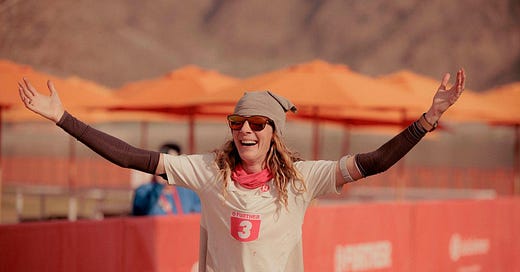If you want proof that stories have power, look no further than the sorry tale of a world class runner trying to manipulate Wikipedia pages to make themselves look better and other runners look lesser.
Last week Canadian Running magazine’s reporter Marley Dickinson broke a story that was disappointing (if true). And perhaps more significantly it contains a clear example of the power of stories, for both good and evil.
If you want to dive into the details, the story is here. The short version is that Camille Herron and her husband Conor Holt (who is also Herron’s coach) have been accused of burnishing – or “fluffing” to use the technical term – her Wikipedia page, adding terms such as “legendary”, “prestigious” and “steely toughness” to the text. This goes against the platform’s rules forbidding editing that is not neutral in tone or where there is a conflict of interest. So far, so silly. But worse, the pair have also been accused of editing other athletes’ Wikipedia entries – including those of Kilian Jornet, Courtner Dauwalter and Des Linden – with the aim of diminishing those athlete’s accomplishments. It is worth noting at this point that Holt has published a mea culpa on Run Ultra website taking full responsibility for the actions of which the couple are accused. He also let it be known that he has paused or deleted Herron’s social media accounts saying “I also went ahead and deactivated all of Camille’s social platforms for the time being because of the vile comments she has received.”
Many people (although presumably not those posting “vile comments” on Herron’s social channels) might ask “so what?” in response to the accusations. And they might be right to question whether this is a storm in a teacup. But there is a deeper issue here. And one that is at the very heart of what we do at Like the Wind.
Stories have power. Herron and many, many others know this. As Noam Chomsky said: “He who controls the media controls the minds of the public.”
That is why people will go to extreme lengths to control stories. Furthermore, in a world where everyone can be a publisher on social media and news is reported (and forgotten) at dizzying speed, staying on top of – and visible in – the popular narrative can become all-consuming.
This is something of which we’re acutely aware at Like the Wind. Especially because once something is committed to paper, it is impossible to edit. Of course, the internet “never forgets” so publishing online also tends to leave a permanent mark. But there is something about holding an ink-on-paper edition in one’s hand that emphasises that we have to be very careful about what we published in our magazine.
There is, of course, so much good that can come from stories. The greatest storytelling inspires action, affects change, calms tensions, inflames passions and transports the reader to times, places and emotions of which they were hitherto unaware.
As the editor at LtW I have the privilege of reading stories as they arrive in our inbox. And many’s the time that I find myself wiping away a tear, laughing out loud, coming to a completely new understanding or imagining a place that is described in beautiful detail by a talented writer.
The point is that “with great power, comes great responsibility”. That phrase, commonly attributed to a Spiderman character called Uncle Ben from the comics created by Marvel Inc., has been found to have antecedents in documents as old as the Bible, it has been used by columnists and writers throughout the ages and was even included in a judgement issued by the Supreme Court of the United States in a case in 2015 (appropriately about a patent dispute involving Marvel).
And ironically the phrase appears in one other significant place – the guidelines issued by the Wikimedia Foundation for how to edit Wikipedia pages.




The interesting thing about Wikipedia is that you cannot edit the page about yourself, as you‘re biased. So you have to resort to fake email addresses or ask other people on your behalf. For a while there were factual mistakes on my wikipedia page and it took me a long time to correct them. For instance, I simply never was a professor at the art university in vienna, I just gave a talk there once…
“The greatest storytelling inspires action, affects change, calms tensions, inflames passions and transports the reader to times, places and emotions of which they were hitherto unaware.”
This! Great reflections. And the last line 💥